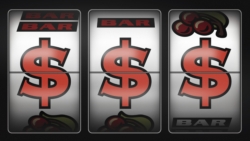Don’t bet on Mass. gambling, Church says
BRAINTREE -- The Catholic Church in Massachusetts is adding its voice to those who say that expanded gambling is a poor bet for the commonwealth.
While several state politicians are again lining up to support legalizing casino gambling on grounds that it will generate revenue for the state and create jobs, opponents argue that casinos exploit the poor, lead to more crime, and increase unemployment.
The Massachusetts Catholic Conference (MCC), the public policy arm of the Catholic Church in Massachusetts, affirmed the state’s bishops’ opposition to the proposed expansion of legalized gambling during Oct. 2009 testimony to a legislative committee on Beacon Hill.
Addressing a legislative committee, MCC Executive Director Edward Saunders quoted a recent statement by the state’s bishops which says “in gambling, especially in casinos and high stake lotteries, there are increased dangers and abuses that warrant vigilance and concern. There is no doubt that gambling can victimize and often surpass ‘legitimate recreation.’ ... [C]asinos and the authorization for additional slot machines will raise gambling to a new level in our commonwealth. In addition, these can also encourage addictive gambling.”
The Catechism of the Catholic Church says that, while gambling can be a legitimate form of recreation, all types of gambling “become morally unacceptable when they deprive someone of what is necessary to provide for his needs and those of others. The passion for gambling risks becoming an enslavement.”
House Speaker Robert DeLeo (D-Winthrop) has recently expressed his support for the creation of casinos in Massachusetts and the installation of slot machines at state racetracks. Seth Gitell, a spokesman for DeLeo, said the speaker hopes to introduce a bill within the next two or three weeks.
DeLeo has two racetracks in his district -- Suffolk Downs in East Boston and Wonderland in Revere.
Suffolk Downs, a horse track, offers live races, but Wonderland features only simulcast greyhound racing after Massachusetts voters opted to ban live dog racing as of Jan. 1.
Developers are discussing a hotel, condos, and a commercial office building for the Wonderland area. A casino at Suffolk Downs is also being proposed. Other casinos are also reportedly being proposed in Middleborough, Palmer and Wrentham.
Heather Johnson, a spokeswoman for Gov. Deval Patrick, said the governor favors “destination, resort-style” casinos but opposes racinos -- racetracks that incorporate slot machines.
Gov. Patrick proposed a plan for casinos in 2007, but it was squashed by former speaker Salvatore DeMasi.
State Senate President Therese Murray also supports the resort-style casinos favored by Gov. Patrick, said her spokesman, David Falcone.
“It’s not just about gambling,” Falcone told The Pilot March 9. “It involves shops, restaurants, and retail -- things that, in terms of jobs, you get a lot more bang for the buck.”
However, while Saunders acknowledges that casinos would create short-term construction jobs, he says that the industry would have long-term negative effects on the state’s job climate.
He says casinos will harm local businesses such as restaurants with the lure of free food and hire already-trained workers from Connecticut, a state that has two destination casinos.
Saunders, along with MCC Public Policy Coordinator Kathy Davis, said the Church opposes the bill on other social grounds as well.
The bill will allow for “predatory gambling,” which Davis says is common with slot machines -- the main source of profit for casinos.
“They prey on human weakness for profit,” Davis said. “Players get a high when they’re playing. Everything is designed so scientifically, to draw players in and keep them there till their money is gone.”
Davis said that slot addiction can result in a rise in domestic violence, child abuse, suicide, bankruptcy and home foreclosures.
“The whole family structure begins to fall apart,” Saunders said. “It’s the beginning of a downhill slide.”
In his Beacon Hill testimony, Saunders cited the United States International Gambling Report Series, a series of academic and government reports, which says that gambling costs taxpayers three dollars in social welfare expenditures for every dollar in revenue generated. Citing the same series, he also said that in areas with casinos, personal bankruptcies rose from 18 to 42 percent, the number of addicts doubled, and crime increased by 10 percent.
DeLeo acknowledged that gambling carries social ramifications in a statement submitted to The Pilot, promising to devote a portion of revenue generated from legalized gambling to addiction treatment programs.
Attorney General Martha Coakley has expressed concern over the proposed gambling expansion, calling for tougher laws against money laundering, organized crime, and wiretapping before Massachusetts legalizes casino gambling.
Les Bernal, Executive Director of Stop Predatory Gambling, and a parishioner at St. Patrick Parish in Lawrence, said that this issue differs from social gambling like office sports pools or charity bingo.
He also said that casino gambling violates the Great Commandment -- “Love your neighbor as yourself.”
“Casino ownership is about loving yourself more than your neighbor because its business practices are based on greed, deceit, and exploitation pushed on our neighbors,” he said.
“This is the only product or service where the people who own it and promote it don’t use it. What’s more predatory than that?” he added. “It’s going to push people into deeper poverty and it’s going to only worsen state budget deficits. The only winners are the people who own the casinos.”



















